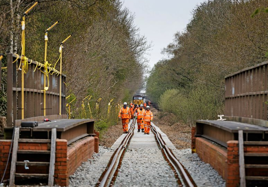SPEED means what?!
SPEED stands for Swift, Pragmatic and Efficient Enhancement Delivery. Yes, really - someone actually came up with that. The acronym was quietly shelved. Now it is just a name.
“They seem to have slipped back into the old ways of doing things,” says Cara Murphy from Atkins.
“There are some projects in flight at the moment. That doesn’t necessarily mean they have all the Speed processes behind them. They have created programmes with truncated timescales and improved efficiencies. But they are re-implementing some of the governance processes that were specifically taken out.
“For it to work, culture has to change at all levels - not just at Network Rail, but across all the contractors and the supply chain, and at the Department for Transport. Otherwise, the ‘this is the way we’ve always done it’ attitude will creep back in.”
“Cara sums it up well there,” says Railway Industry Association Technical Director David Clarke.
“Where Speed has been successful is in the relationship between Network Rail and the Department for Transport. It has accelerated the decision-making process between them.
“A lot of cost escalation came on projects where decisions were not made quickly. Or they were made, but then changed much later on. Or, worse, the taxi meter was left running without any decisions being made.
“Often, jobs are too tightly defined by the time the supplier gets involved. If you want to know how to build something, ask a builder! That’s why we keep banging on about early contractor engagement.”
Some 80% of Network Rail’s spend on enhancement is through contractors. Christian Irwin admits that in the past, they have been excluded from the decision-making process. He says they have now been brought in and sit at the table.
“A lot of the cost is in the decision making,” he agrees. “Our traditional GRIP process led us to develop many options. And those options took a lot of time.
“Instead, we need to get a Minimum Viable Product. We need to think of the outcome we need to achieve.
“Using the example of the Dartmoor Line, at the conception of that project we got together with the local community and the local authorities and decided the sole ambition was to restore regular seven-day passenger services between Okehampton and Exeter.
“That was the required outcome. Not how much track had to be laid, how many signals would be needed, how many bridges would need re-facing. That allowed us to design a specification to achieve the Minimum Viable Product at the lowest possible cost.
“In every project, we must do that. We have to get a mindset of intolerance of waste.
“Mindset is the biggest driver. Cultural change. Whatever you want to call it. We have to get every single person - engineer, sponsor, manager, commercial and procurement - thinking about how to be bold, curious and innovative about driving efficiency.
“We need to provide the toolset to do this. And the skillset. Our people have been used to a way of working for the last ten, 15, 20 years. We have to train them, modify their competencies.”
Murphy adds: “You can apply the principles to maintenance and renewals, but that is not being done at the moment. The existing approach to maintenance doesn’t seem to have much science applied to it. And is the subject of industrial action.”
Murphy is a straight-talking Australian - formerly a management consultant in the rail sector there, but now with a decade of experience in the UK.
“Speed is happening in pockets, where you’ve got the right management to focus on it,” she says.
“Speed needs to have time spent on doing it right. It needs the right people in the room. Otherwise, it is just another tick-box exercise. Bringing all the people together to get acceptance at the start is not really happening, which means it’s too easy to slip back into standard project delivery.
“I’m a wholehearted supporter of Project Speed, but I am pessimistic that it will be implemented consistently and concisely, delivering the benefits that it is supposed to achieve.
“I think that is because of the pressures on Network Rail: cost-cutting via having a smaller workforce, rather than by having greater efficiency, and not having the time to think about the trade-off between those two.”
“Speed has gone through two phases and is into a third,” says RIA’s David Clarke.
“First, there was lots of engagement in the big new thing. There were exemplar projects. If you were on Okehampton or the Northumberland Line, you thought it was great.













